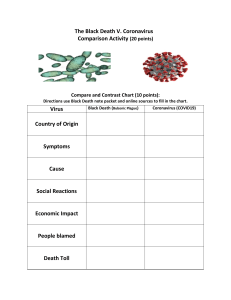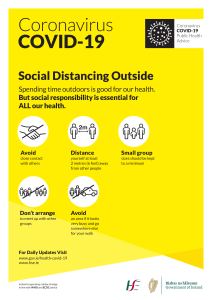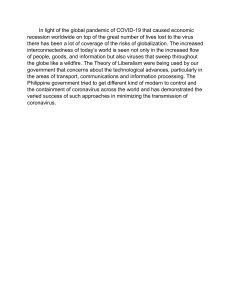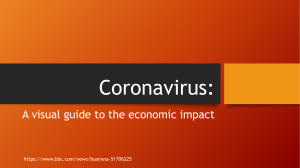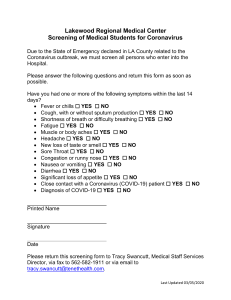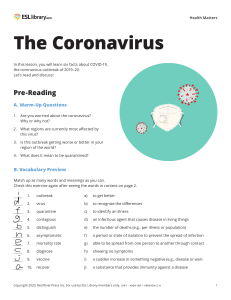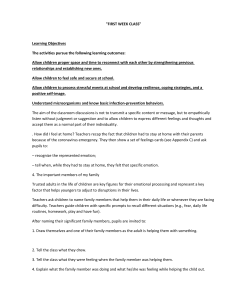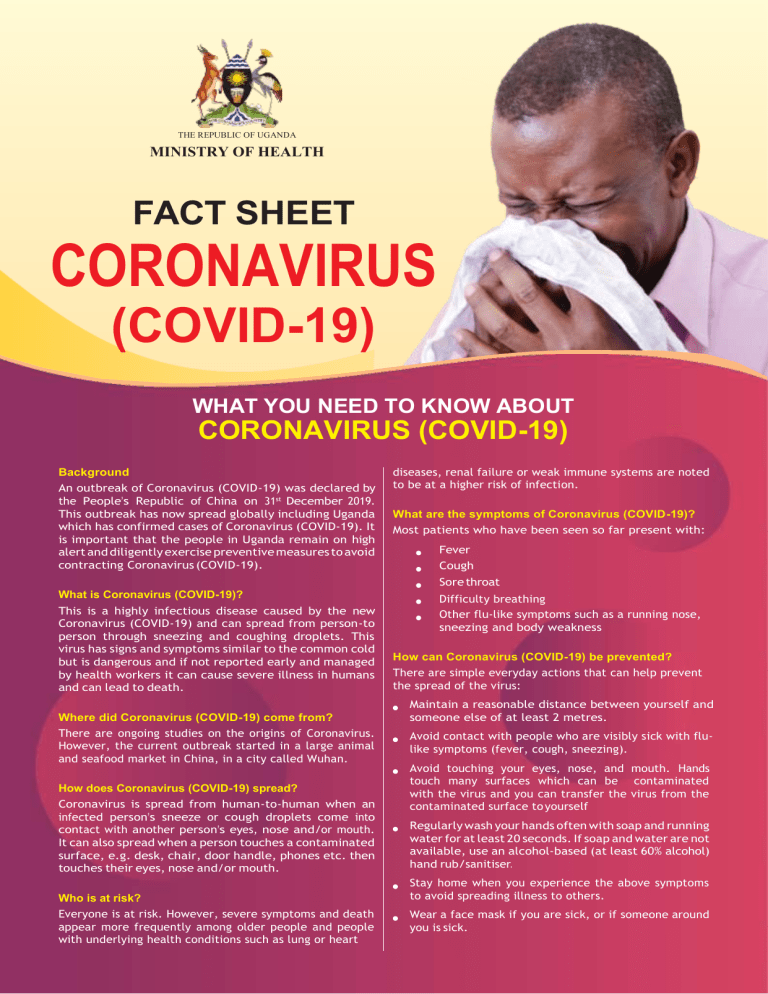
THE REPUBLIC OF UGANDA MINISTRY OF HEALTH FACT SHEET CORONAVIRUS (COVID-19) WHAT YOU NEED TO KNOW ABOUT CORONAVIRUS (COVID-19) Background An outbreak of Coronavirus (COVID-19) was declared by the People’s Republic of China on 31st December 2019. This outbreak has now spread globally including Uganda which has confirmed cases of Coronavirus (COVID-19). It is important that the people in Uganda remain on high alert and diligently exercise preventive measures to avoid contracting Coronavirus (COVID-19). diseases, renal failure or weak immune systems are noted to be at a higher risk of infection. What are the symptoms of Coronavirus (COVID-19)? Most patients who have been seen so far present with: Fever Cough Sore throat What is Coronavirus (COVID-19)? This is a highly infectious disease caused by the new Coronavirus (COVID-19) and can spread from person-to person through sneezing and coughing droplets. This virus has signs and symptoms similar to the common cold but is dangerous and if not reported early and managed by health workers it can cause severe illness in humans and can lead to death. Where did Coronavirus (COVID-19) come from? There are ongoing studies on the origins of Coronavirus. However, the current outbreak started in a large animal and seafood market in China, in a city called Wuhan. How does Coronavirus (COVID-19) spread? Coronavirus is spread from human-to-human when an infected person’s sneeze or cough droplets come into contact with another person’s eyes, nose and/or mouth. It can also spread when a person touches a contaminated surface, e.g. desk, chair, door handle, phones etc. then touches their eyes, nose and/or mouth. Who is at risk? Everyone is at risk. However, severe symptoms and death appear more frequently among older people and people with underlying health conditions such as lung or heart Difficulty breathing Other flu-like symptoms such as a running nose, sneezing and body weakness How can Coronavirus (COVID-19) be prevented? There are simple everyday actions that can help prevent the spread of the virus: Maintain a reasonable distance between yourself and someone else of at least 2 metres. Avoid contact with people who are visibly sick with flulike symptoms (fever, cough, sneezing). Avoid touching your eyes, nose, and mouth. Hands touch many surfaces which can be contaminated with the virus and you can transfer the virus from the contaminated surface to yourself Regularly wash your hands often with soap and running water for at least 20 seconds. If soap and water are not available, use an alcohol-based (at least 60% alcohol) hand rub/sanitiser. Stay home when you experience the above symptoms to avoid spreading illness to others. Wear a face mask if you are sick, or if someone around you is sick. CORONAVIRUS (COVID-19) FACTSHEET Cover your mouth and nose with tissue or a handkerchief when coughing and sneezing. Throw away the used tissue immediately and wash your hands with soap and running water or use an alcohol-based hand rub. The handkerchief must be washed by yourself daily and ironed with a hot iron. In this way, you protect others from any virus released through coughs and sneezes. Regularly clean and disinfect frequently touched surfaces such as doorknobs/handles, car doors, elevator buttons etc. daily with regular household disinfectant or soap and water Avoid unnecessary movements to prevent the spread of the virus. Is there a vaccine to prevent or cure a person from Coronavirus (COVID-19)? There is currently no cure or vaccine to protect against Coronavirus (COVID-19). The best way to prevent infection is to avoid being exposed to the virus or to those infected with the virus by following the preventive measures. Is there a treatment for Coronavirus (COVID-19)? There is no specific antiviral treatment. However, people with symptoms should seek medical care immediately to help relieve symptoms and manage complications. When managed early, complications and death can be avoided, and the risk of spread is reduced. How to manage someone with Coronavirus (COVID-19) at home? The best place to manage a sick person with Coronavirus (COVID-19) is at a hospital. However, if the patient is to be managed at home you should: provide the patient with a face mask. Limit the number of caretakers of the patient to only one person who is in good health should take care of the patient. The person caring for the patient should wear a face mask for his or her personal protection. Wash your hands with running water and soap following all contact with sick persons or their immediate environment. Avoid direct contact with body fluids, particularly oral or respiratory secretions or stool of the patient. Avoid sharing toothbrushes, eating utensils, dishes, drinks, towels, washcloths or bed linen with the sick person. Regularly clean and disinfect frequently touched surfaces such as doorknobs/handles, bedside tables, bedframes, and other bedroom furniture daily with regular household disinfectant containing a diluted bleach solution (1- part bleach to 99 parts water) or soap. Clean and disinfect bathroom and toilet surfaces at least once a day with regular household disinfectant containing a diluted bleach solution (1- part bleach to 99 parts water) or soap. Persons with symptoms should remain at home until their symptoms are resolved based on either clinical and/or laboratory findings. All household members should be considered contacts and their health should be monitored. If a household member develops symptoms of acute respiratory infection, including fever, cough, sore throat and difficulty breathing contact your District Health Officer (DHO) or call the Ministry of Health toll free numbers on: 919, 0800-100-066, 0800-203-033, 0800-303-033 or on WhatsApp 0770-818-139 Place the patient in a well-ventilated single room and KEY MESSAGES Maintain a reasonable distance between yourself and someone else of at least 2 metres Avoid contact with persons who show flu-like symptoms Cover your mouth and nose when sneezing or coughing Regularly wash your hands with soap and running water Whenever possible avoid touching money and try to use alternative payment methods such as mobile money. Ensure you wash your hands thoroughly with soap and running water after touching money Thoroughly cook meat, poultry and eggs For more information, call the Ministry of Health toll free line on: 919, 0800-100-066, 0800-203-033 and 0800-303-033 or send a free SMS to Ureport on 8500 or WhatsApp on 0770-818-139

